Juvenile Detention Reflection: Changes in Understanding and Insights
VerifiedAdded on 2023/01/23
|7
|1674
|91
Essay
AI Summary
This essay is a reflection on the student's research regarding juvenile detention. The student explores how their understanding of the topic has evolved through research, focusing on the negative impacts of juvenile detention on the psychological development and well-being of children. The essay discusses the juvenile justice system, comparing it to the adult system, and addresses the student's initial assumptions about juvenile detention. The student highlights how their research, including the analysis of scholarly articles and interaction with classmates and professors, has altered their perspectives and deepened their understanding of the issue. The essay emphasizes the importance of recognizing the potential for juvenile detention to cause more harm than good, potentially leading to increased offending in adulthood. The student concludes by stating that this research has significantly increased their awareness of the topic and enabled them to view the issue from a different perspective.
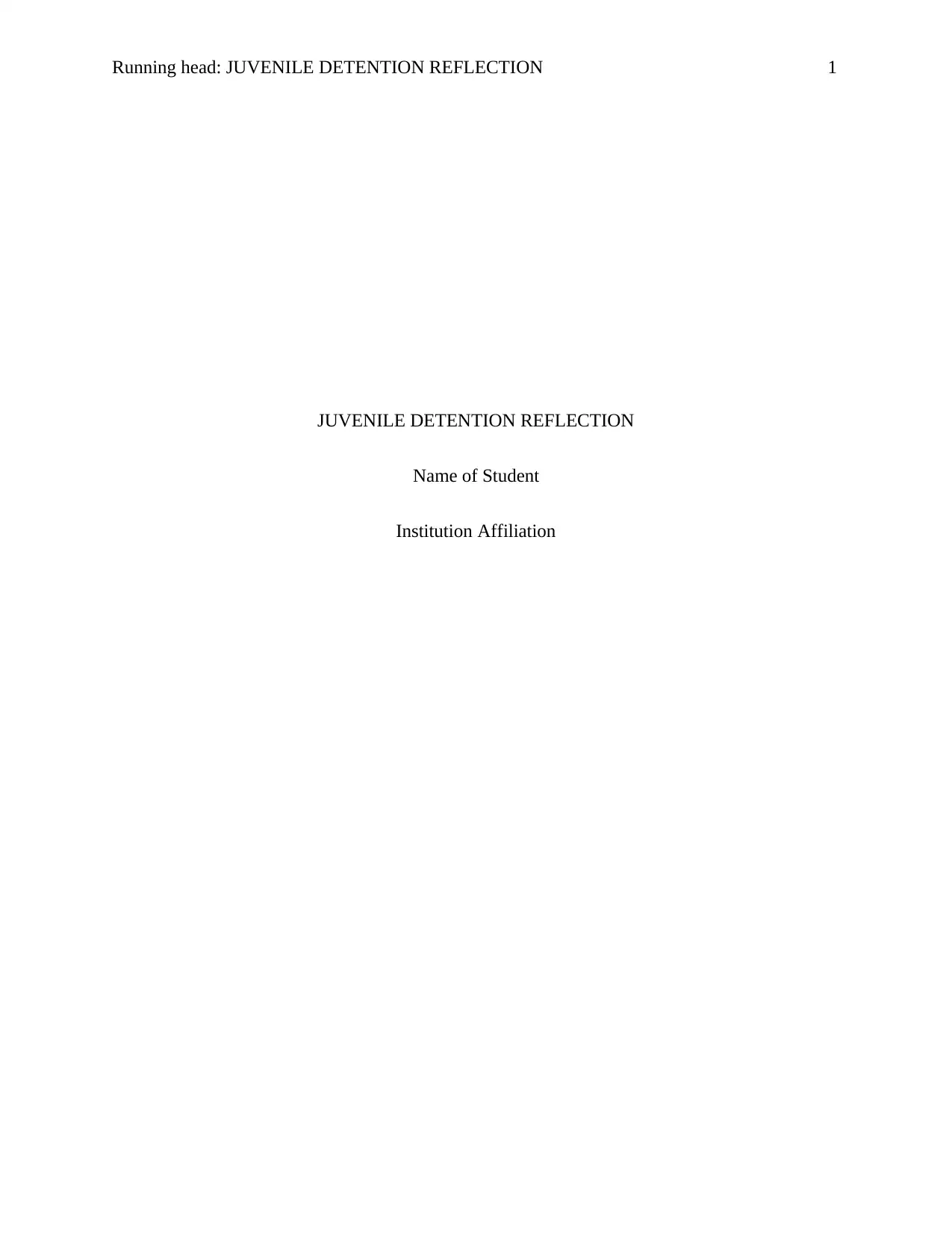
Running head: JUVENILE DETENTION REFLECTION 1
JUVENILE DETENTION REFLECTION
Name of Student
Institution Affiliation
JUVENILE DETENTION REFLECTION
Name of Student
Institution Affiliation
Paraphrase This Document
Need a fresh take? Get an instant paraphrase of this document with our AI Paraphraser
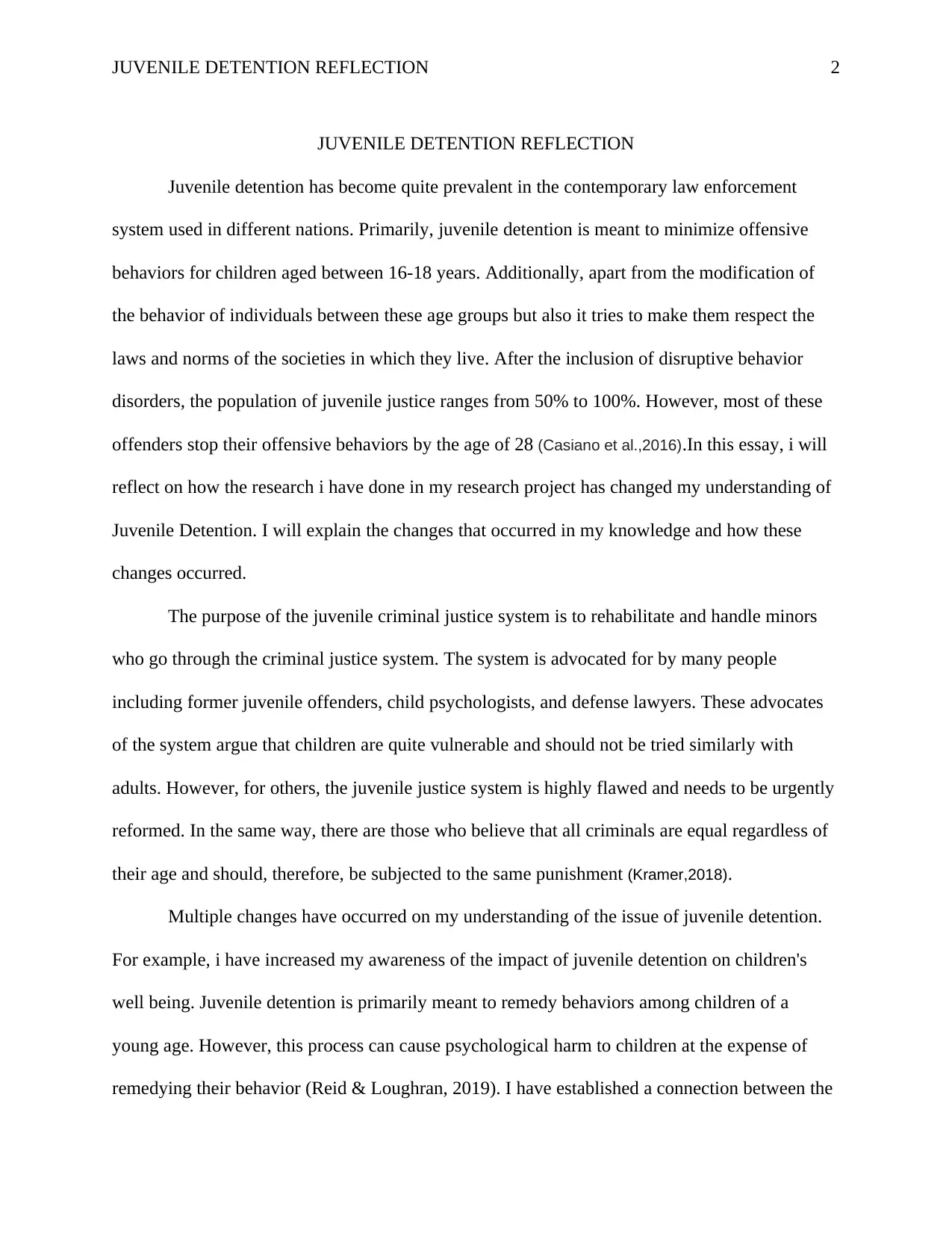
JUVENILE DETENTION REFLECTION 2
JUVENILE DETENTION REFLECTION
Juvenile detention has become quite prevalent in the contemporary law enforcement
system used in different nations. Primarily, juvenile detention is meant to minimize offensive
behaviors for children aged between 16-18 years. Additionally, apart from the modification of
the behavior of individuals between these age groups but also it tries to make them respect the
laws and norms of the societies in which they live. After the inclusion of disruptive behavior
disorders, the population of juvenile justice ranges from 50% to 100%. However, most of these
offenders stop their offensive behaviors by the age of 28 (Casiano et al.,2016).In this essay, i will
reflect on how the research i have done in my research project has changed my understanding of
Juvenile Detention. I will explain the changes that occurred in my knowledge and how these
changes occurred.
The purpose of the juvenile criminal justice system is to rehabilitate and handle minors
who go through the criminal justice system. The system is advocated for by many people
including former juvenile offenders, child psychologists, and defense lawyers. These advocates
of the system argue that children are quite vulnerable and should not be tried similarly with
adults. However, for others, the juvenile justice system is highly flawed and needs to be urgently
reformed. In the same way, there are those who believe that all criminals are equal regardless of
their age and should, therefore, be subjected to the same punishment (Kramer,2018).
Multiple changes have occurred on my understanding of the issue of juvenile detention.
For example, i have increased my awareness of the impact of juvenile detention on children's
well being. Juvenile detention is primarily meant to remedy behaviors among children of a
young age. However, this process can cause psychological harm to children at the expense of
remedying their behavior (Reid & Loughran, 2019). I have established a connection between the
JUVENILE DETENTION REFLECTION
Juvenile detention has become quite prevalent in the contemporary law enforcement
system used in different nations. Primarily, juvenile detention is meant to minimize offensive
behaviors for children aged between 16-18 years. Additionally, apart from the modification of
the behavior of individuals between these age groups but also it tries to make them respect the
laws and norms of the societies in which they live. After the inclusion of disruptive behavior
disorders, the population of juvenile justice ranges from 50% to 100%. However, most of these
offenders stop their offensive behaviors by the age of 28 (Casiano et al.,2016).In this essay, i will
reflect on how the research i have done in my research project has changed my understanding of
Juvenile Detention. I will explain the changes that occurred in my knowledge and how these
changes occurred.
The purpose of the juvenile criminal justice system is to rehabilitate and handle minors
who go through the criminal justice system. The system is advocated for by many people
including former juvenile offenders, child psychologists, and defense lawyers. These advocates
of the system argue that children are quite vulnerable and should not be tried similarly with
adults. However, for others, the juvenile justice system is highly flawed and needs to be urgently
reformed. In the same way, there are those who believe that all criminals are equal regardless of
their age and should, therefore, be subjected to the same punishment (Kramer,2018).
Multiple changes have occurred on my understanding of the issue of juvenile detention.
For example, i have increased my awareness of the impact of juvenile detention on children's
well being. Juvenile detention is primarily meant to remedy behaviors among children of a
young age. However, this process can cause psychological harm to children at the expense of
remedying their behavior (Reid & Loughran, 2019). I have established a connection between the
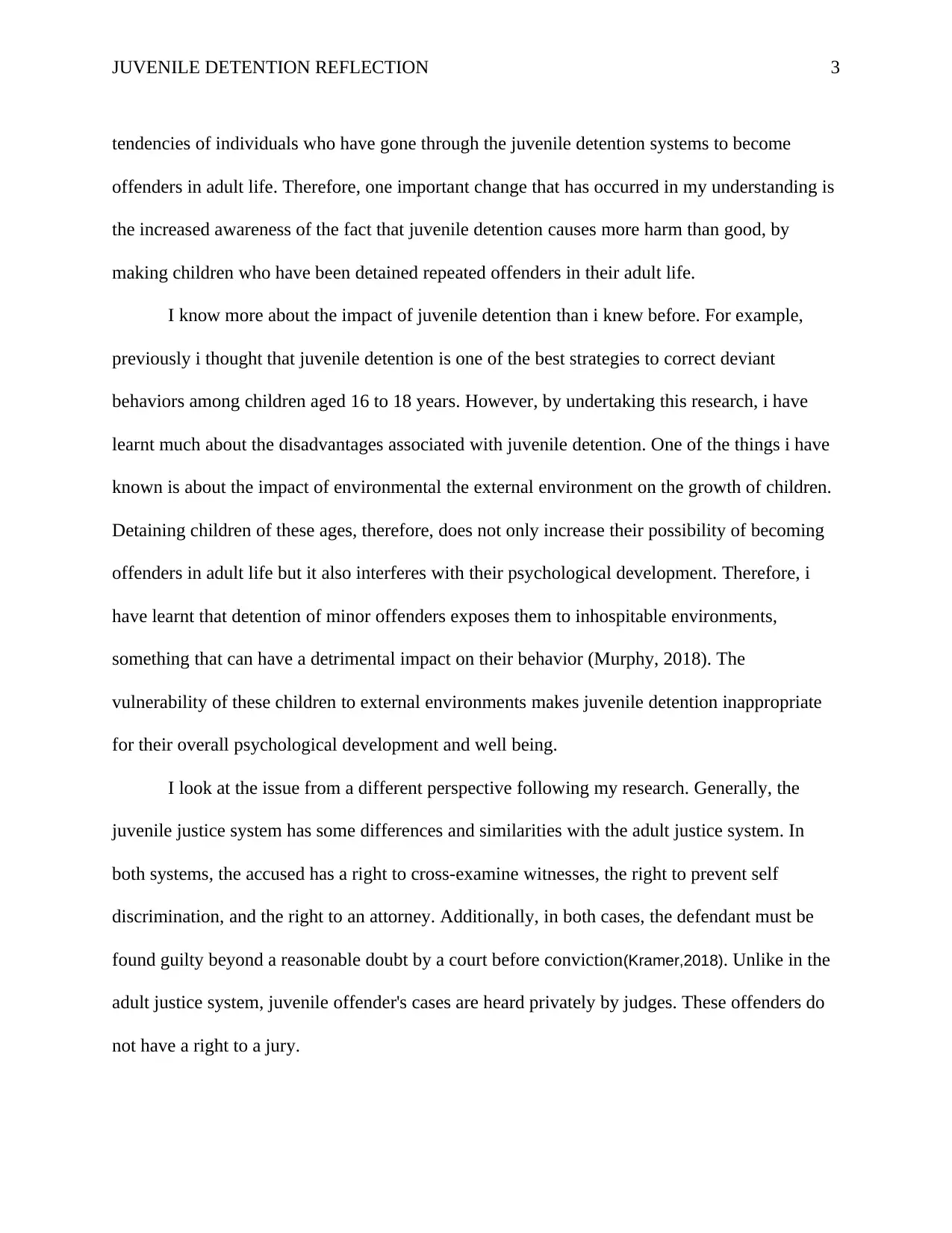
JUVENILE DETENTION REFLECTION 3
tendencies of individuals who have gone through the juvenile detention systems to become
offenders in adult life. Therefore, one important change that has occurred in my understanding is
the increased awareness of the fact that juvenile detention causes more harm than good, by
making children who have been detained repeated offenders in their adult life.
I know more about the impact of juvenile detention than i knew before. For example,
previously i thought that juvenile detention is one of the best strategies to correct deviant
behaviors among children aged 16 to 18 years. However, by undertaking this research, i have
learnt much about the disadvantages associated with juvenile detention. One of the things i have
known is about the impact of environmental the external environment on the growth of children.
Detaining children of these ages, therefore, does not only increase their possibility of becoming
offenders in adult life but it also interferes with their psychological development. Therefore, i
have learnt that detention of minor offenders exposes them to inhospitable environments,
something that can have a detrimental impact on their behavior (Murphy, 2018). The
vulnerability of these children to external environments makes juvenile detention inappropriate
for their overall psychological development and well being.
I look at the issue from a different perspective following my research. Generally, the
juvenile justice system has some differences and similarities with the adult justice system. In
both systems, the accused has a right to cross-examine witnesses, the right to prevent self
discrimination, and the right to an attorney. Additionally, in both cases, the defendant must be
found guilty beyond a reasonable doubt by a court before conviction(Kramer,2018). Unlike in the
adult justice system, juvenile offender's cases are heard privately by judges. These offenders do
not have a right to a jury.
tendencies of individuals who have gone through the juvenile detention systems to become
offenders in adult life. Therefore, one important change that has occurred in my understanding is
the increased awareness of the fact that juvenile detention causes more harm than good, by
making children who have been detained repeated offenders in their adult life.
I know more about the impact of juvenile detention than i knew before. For example,
previously i thought that juvenile detention is one of the best strategies to correct deviant
behaviors among children aged 16 to 18 years. However, by undertaking this research, i have
learnt much about the disadvantages associated with juvenile detention. One of the things i have
known is about the impact of environmental the external environment on the growth of children.
Detaining children of these ages, therefore, does not only increase their possibility of becoming
offenders in adult life but it also interferes with their psychological development. Therefore, i
have learnt that detention of minor offenders exposes them to inhospitable environments,
something that can have a detrimental impact on their behavior (Murphy, 2018). The
vulnerability of these children to external environments makes juvenile detention inappropriate
for their overall psychological development and well being.
I look at the issue from a different perspective following my research. Generally, the
juvenile justice system has some differences and similarities with the adult justice system. In
both systems, the accused has a right to cross-examine witnesses, the right to prevent self
discrimination, and the right to an attorney. Additionally, in both cases, the defendant must be
found guilty beyond a reasonable doubt by a court before conviction(Kramer,2018). Unlike in the
adult justice system, juvenile offender's cases are heard privately by judges. These offenders do
not have a right to a jury.
⊘ This is a preview!⊘
Do you want full access?
Subscribe today to unlock all pages.

Trusted by 1+ million students worldwide
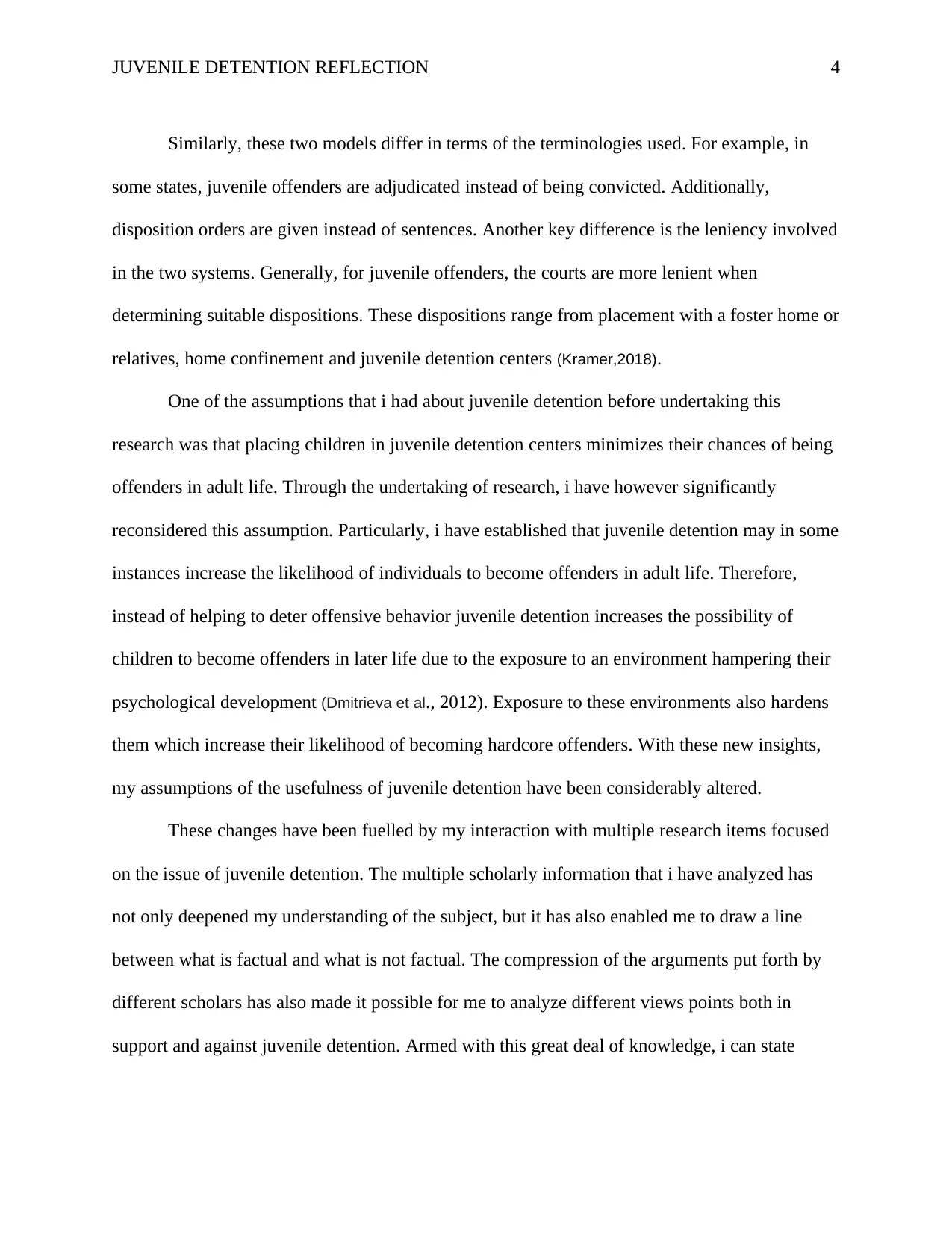
JUVENILE DETENTION REFLECTION 4
Similarly, these two models differ in terms of the terminologies used. For example, in
some states, juvenile offenders are adjudicated instead of being convicted. Additionally,
disposition orders are given instead of sentences. Another key difference is the leniency involved
in the two systems. Generally, for juvenile offenders, the courts are more lenient when
determining suitable dispositions. These dispositions range from placement with a foster home or
relatives, home confinement and juvenile detention centers (Kramer,2018).
One of the assumptions that i had about juvenile detention before undertaking this
research was that placing children in juvenile detention centers minimizes their chances of being
offenders in adult life. Through the undertaking of research, i have however significantly
reconsidered this assumption. Particularly, i have established that juvenile detention may in some
instances increase the likelihood of individuals to become offenders in adult life. Therefore,
instead of helping to deter offensive behavior juvenile detention increases the possibility of
children to become offenders in later life due to the exposure to an environment hampering their
psychological development (Dmitrieva et al., 2012). Exposure to these environments also hardens
them which increase their likelihood of becoming hardcore offenders. With these new insights,
my assumptions of the usefulness of juvenile detention have been considerably altered.
These changes have been fuelled by my interaction with multiple research items focused
on the issue of juvenile detention. The multiple scholarly information that i have analyzed has
not only deepened my understanding of the subject, but it has also enabled me to draw a line
between what is factual and what is not factual. The compression of the arguments put forth by
different scholars has also made it possible for me to analyze different views points both in
support and against juvenile detention. Armed with this great deal of knowledge, i can state
Similarly, these two models differ in terms of the terminologies used. For example, in
some states, juvenile offenders are adjudicated instead of being convicted. Additionally,
disposition orders are given instead of sentences. Another key difference is the leniency involved
in the two systems. Generally, for juvenile offenders, the courts are more lenient when
determining suitable dispositions. These dispositions range from placement with a foster home or
relatives, home confinement and juvenile detention centers (Kramer,2018).
One of the assumptions that i had about juvenile detention before undertaking this
research was that placing children in juvenile detention centers minimizes their chances of being
offenders in adult life. Through the undertaking of research, i have however significantly
reconsidered this assumption. Particularly, i have established that juvenile detention may in some
instances increase the likelihood of individuals to become offenders in adult life. Therefore,
instead of helping to deter offensive behavior juvenile detention increases the possibility of
children to become offenders in later life due to the exposure to an environment hampering their
psychological development (Dmitrieva et al., 2012). Exposure to these environments also hardens
them which increase their likelihood of becoming hardcore offenders. With these new insights,
my assumptions of the usefulness of juvenile detention have been considerably altered.
These changes have been fuelled by my interaction with multiple research items focused
on the issue of juvenile detention. The multiple scholarly information that i have analyzed has
not only deepened my understanding of the subject, but it has also enabled me to draw a line
between what is factual and what is not factual. The compression of the arguments put forth by
different scholars has also made it possible for me to analyze different views points both in
support and against juvenile detention. Armed with this great deal of knowledge, i can state
Paraphrase This Document
Need a fresh take? Get an instant paraphrase of this document with our AI Paraphraser
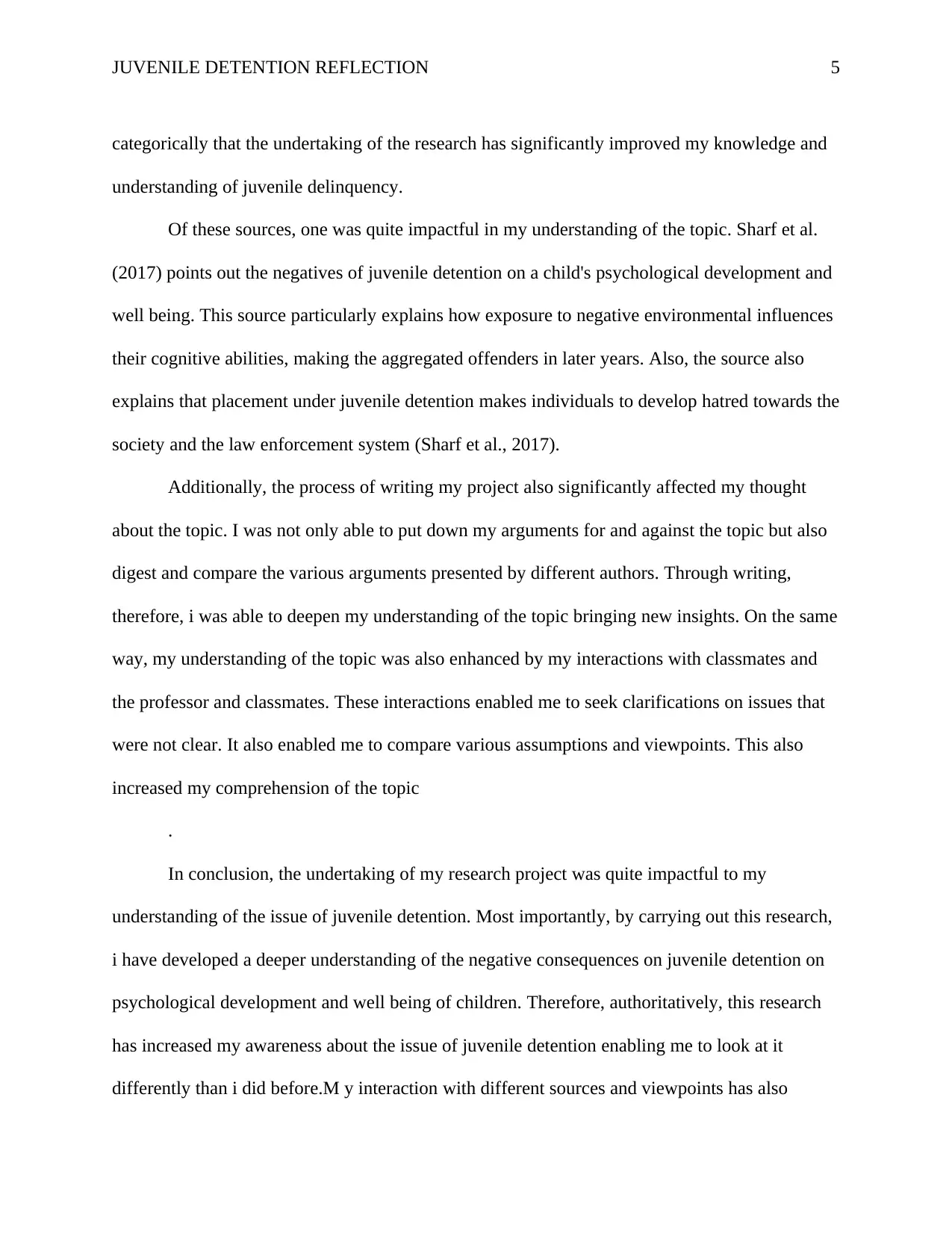
JUVENILE DETENTION REFLECTION 5
categorically that the undertaking of the research has significantly improved my knowledge and
understanding of juvenile delinquency.
Of these sources, one was quite impactful in my understanding of the topic. Sharf et al.
(2017) points out the negatives of juvenile detention on a child's psychological development and
well being. This source particularly explains how exposure to negative environmental influences
their cognitive abilities, making the aggregated offenders in later years. Also, the source also
explains that placement under juvenile detention makes individuals to develop hatred towards the
society and the law enforcement system (Sharf et al., 2017).
Additionally, the process of writing my project also significantly affected my thought
about the topic. I was not only able to put down my arguments for and against the topic but also
digest and compare the various arguments presented by different authors. Through writing,
therefore, i was able to deepen my understanding of the topic bringing new insights. On the same
way, my understanding of the topic was also enhanced by my interactions with classmates and
the professor and classmates. These interactions enabled me to seek clarifications on issues that
were not clear. It also enabled me to compare various assumptions and viewpoints. This also
increased my comprehension of the topic
.
In conclusion, the undertaking of my research project was quite impactful to my
understanding of the issue of juvenile detention. Most importantly, by carrying out this research,
i have developed a deeper understanding of the negative consequences on juvenile detention on
psychological development and well being of children. Therefore, authoritatively, this research
has increased my awareness about the issue of juvenile detention enabling me to look at it
differently than i did before.M y interaction with different sources and viewpoints has also
categorically that the undertaking of the research has significantly improved my knowledge and
understanding of juvenile delinquency.
Of these sources, one was quite impactful in my understanding of the topic. Sharf et al.
(2017) points out the negatives of juvenile detention on a child's psychological development and
well being. This source particularly explains how exposure to negative environmental influences
their cognitive abilities, making the aggregated offenders in later years. Also, the source also
explains that placement under juvenile detention makes individuals to develop hatred towards the
society and the law enforcement system (Sharf et al., 2017).
Additionally, the process of writing my project also significantly affected my thought
about the topic. I was not only able to put down my arguments for and against the topic but also
digest and compare the various arguments presented by different authors. Through writing,
therefore, i was able to deepen my understanding of the topic bringing new insights. On the same
way, my understanding of the topic was also enhanced by my interactions with classmates and
the professor and classmates. These interactions enabled me to seek clarifications on issues that
were not clear. It also enabled me to compare various assumptions and viewpoints. This also
increased my comprehension of the topic
.
In conclusion, the undertaking of my research project was quite impactful to my
understanding of the issue of juvenile detention. Most importantly, by carrying out this research,
i have developed a deeper understanding of the negative consequences on juvenile detention on
psychological development and well being of children. Therefore, authoritatively, this research
has increased my awareness about the issue of juvenile detention enabling me to look at it
differently than i did before.M y interaction with different sources and viewpoints has also
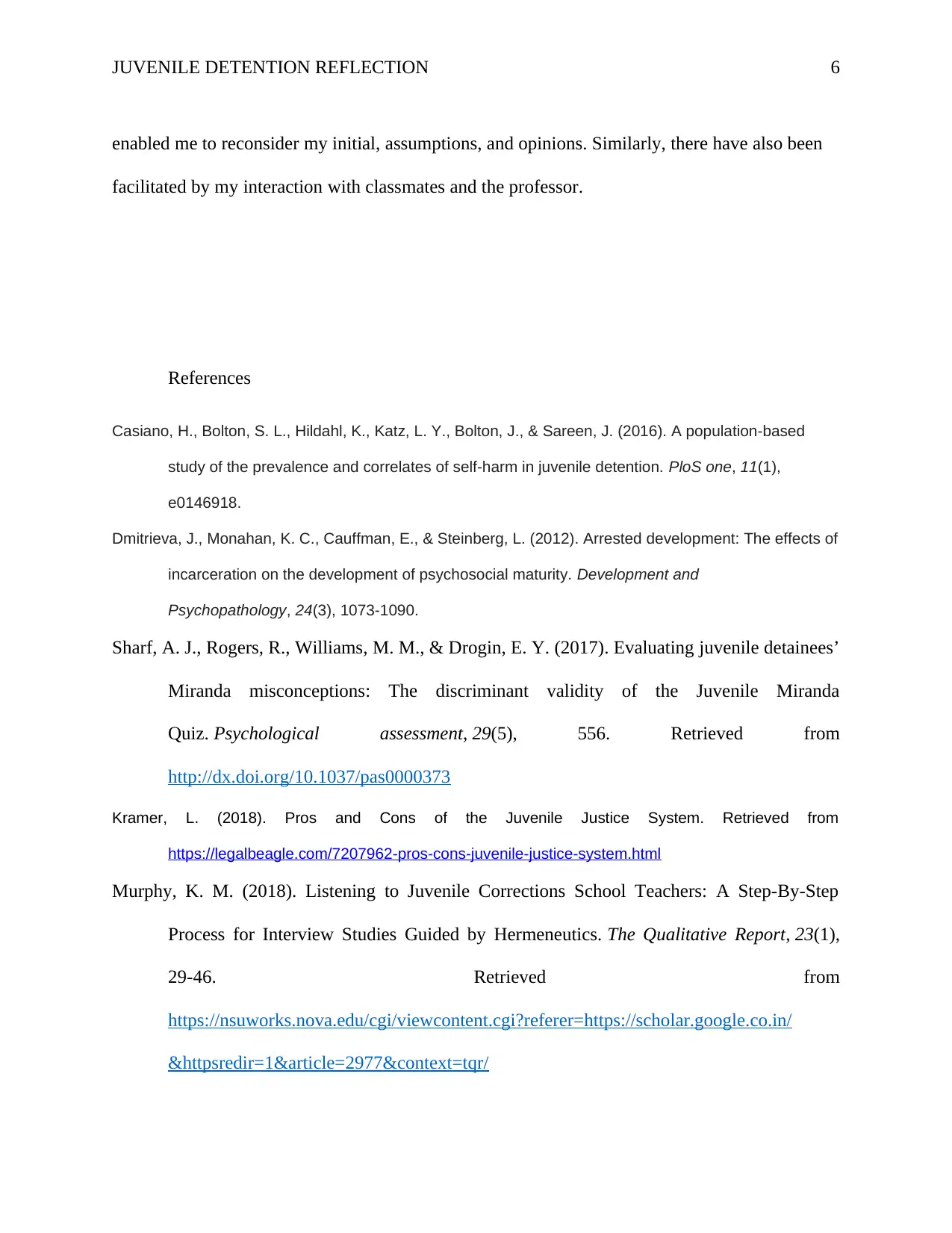
JUVENILE DETENTION REFLECTION 6
enabled me to reconsider my initial, assumptions, and opinions. Similarly, there have also been
facilitated by my interaction with classmates and the professor.
References
Casiano, H., Bolton, S. L., Hildahl, K., Katz, L. Y., Bolton, J., & Sareen, J. (2016). A population-based
study of the prevalence and correlates of self-harm in juvenile detention. PloS one, 11(1),
e0146918.
Dmitrieva, J., Monahan, K. C., Cauffman, E., & Steinberg, L. (2012). Arrested development: The effects of
incarceration on the development of psychosocial maturity. Development and
Psychopathology, 24(3), 1073-1090.
Sharf, A. J., Rogers, R., Williams, M. M., & Drogin, E. Y. (2017). Evaluating juvenile detainees’
Miranda misconceptions: The discriminant validity of the Juvenile Miranda
Quiz. Psychological assessment, 29(5), 556. Retrieved from
http://dx.doi.org/10.1037/pas0000373
Kramer, L. (2018). Pros and Cons of the Juvenile Justice System. Retrieved from
https://legalbeagle.com/7207962-pros-cons-juvenile-justice-system.html
Murphy, K. M. (2018). Listening to Juvenile Corrections School Teachers: A Step-By-Step
Process for Interview Studies Guided by Hermeneutics. The Qualitative Report, 23(1),
29-46. Retrieved from
https://nsuworks.nova.edu/cgi/viewcontent.cgi?referer=https://scholar.google.co.in/
&httpsredir=1&article=2977&context=tqr/
enabled me to reconsider my initial, assumptions, and opinions. Similarly, there have also been
facilitated by my interaction with classmates and the professor.
References
Casiano, H., Bolton, S. L., Hildahl, K., Katz, L. Y., Bolton, J., & Sareen, J. (2016). A population-based
study of the prevalence and correlates of self-harm in juvenile detention. PloS one, 11(1),
e0146918.
Dmitrieva, J., Monahan, K. C., Cauffman, E., & Steinberg, L. (2012). Arrested development: The effects of
incarceration on the development of psychosocial maturity. Development and
Psychopathology, 24(3), 1073-1090.
Sharf, A. J., Rogers, R., Williams, M. M., & Drogin, E. Y. (2017). Evaluating juvenile detainees’
Miranda misconceptions: The discriminant validity of the Juvenile Miranda
Quiz. Psychological assessment, 29(5), 556. Retrieved from
http://dx.doi.org/10.1037/pas0000373
Kramer, L. (2018). Pros and Cons of the Juvenile Justice System. Retrieved from
https://legalbeagle.com/7207962-pros-cons-juvenile-justice-system.html
Murphy, K. M. (2018). Listening to Juvenile Corrections School Teachers: A Step-By-Step
Process for Interview Studies Guided by Hermeneutics. The Qualitative Report, 23(1),
29-46. Retrieved from
https://nsuworks.nova.edu/cgi/viewcontent.cgi?referer=https://scholar.google.co.in/
&httpsredir=1&article=2977&context=tqr/
⊘ This is a preview!⊘
Do you want full access?
Subscribe today to unlock all pages.

Trusted by 1+ million students worldwide

JUVENILE DETENTION REFLECTION 7
Reid, J. A., & Loughran, T. A. (2019). Parallel‐process trajectories of exposure to violence and
psychological distress among justice‐involved youth. Criminal behavior and mental
health. Retrieved from https://onlinelibrary.wiley.com/doi/abs/10.1002/cbm.2108
Reid, J. A., & Loughran, T. A. (2019). Parallel‐process trajectories of exposure to violence and
psychological distress among justice‐involved youth. Criminal behavior and mental
health. Retrieved from https://onlinelibrary.wiley.com/doi/abs/10.1002/cbm.2108
1 out of 7
Related Documents
Your All-in-One AI-Powered Toolkit for Academic Success.
+13062052269
info@desklib.com
Available 24*7 on WhatsApp / Email
![[object Object]](/_next/static/media/star-bottom.7253800d.svg)
Unlock your academic potential
Copyright © 2020–2026 A2Z Services. All Rights Reserved. Developed and managed by ZUCOL.




